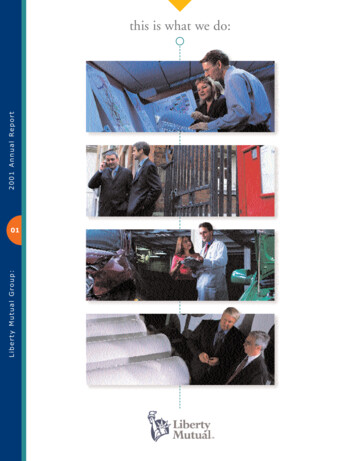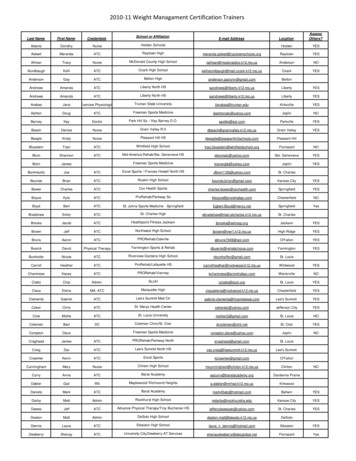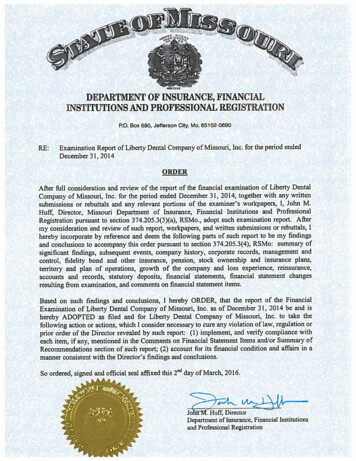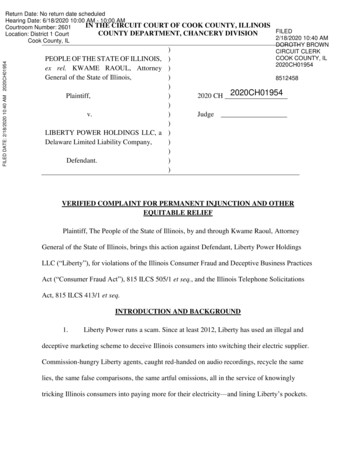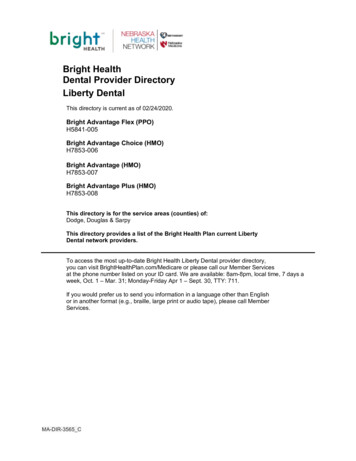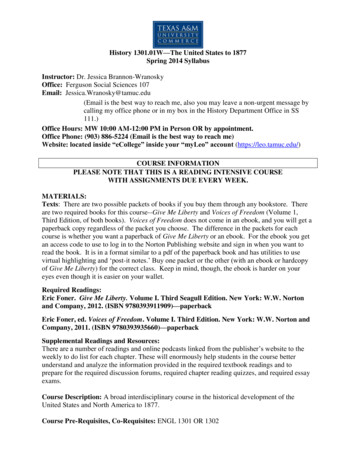
Transcription
FALL 2009 ISSUE I
LAMPFALL 2009 ISSUE 1LAMP is a literary magazine which publishes creative pieces andcritical essays written by current students and alumni of LibertyUniversity; the views expressed are those of the contributors and donot necessarily reflect those of the LAMP staff or Liberty University.LAMP aspires to stimulate readers both within and outside theUniversity with the creativity and critical work of its contributors.Contents5 . . . . . . art . . . . . . . . . . . UntitledSARA HOFFMANN6 . . . . . . essay. . . . . . . . . . Why So Serious, Misfit? A Consideration ofComfortable NihilismNICK OLSON8 . . . . . . art . . . . . . . . . . . EgoismThe LAMP staff would like to thank Mr. Danny Horsley and SeckmanPrinting for the printing of this issue. Their generosity has helped to make thisissue possible. Visit them on the web: http://www.seckmanprinting.com.KELLY LEVESQUE11 . . . . . poetry. . . . . . . . . Worship MeBRITTIANY GODBY12 . . . . . art . . . . . . . . . . . UntitledBEN TAYLOR13 . . . . . poetry. . . . . . . . . No Time to WhimperTIM MATTINGLYAll authors and artists retain copyright for the works published in LAMP.14 . . . . . art . . . . . . . . . . . Small SwirlsMORGAINE GODWINGeneral Faculty AdvisorGraphics / Layout Faculty AdvisorDr. Karen Swallow PriorProfessor Edward EdmanGeneral EditorGraphics / Layout EditorRyan KnightKathleen OstromAssistant EditorGraphics / Layout Assistant EditorNick OlsonEmma Sattler15 . . . . . poetry. . . . . . . . . Coming StormANGELICA ATKINS16 . . . . . fiction. . . . . . . . . The Inn of the Three Rejected BrothersTESS STOCKSLAGER18 . . . . . art . . . . . . . . . . . Sir PhilosopherLAURA FEAGAN22 . . . . . art . . . . . . . . . . . UntitledLAUREN BELL23 . . . . . poetry. . . . . . . . . Help WantedJOE DICKINSONReaderAlexandra BarylskiReader: FictionMr. T. Marcus Christian24 . . . . . poetry. . . . . . . . . A Worn NoteALEXANDRA BARYLSKI25 . . . . . fiction. . . . . . . . . TomorrowRYAN MASTERS26 . . . . . art . . . . . . . . . . . Dr. GreyLEE ANN ZIPAGANReader: PoetryJohn GossleeFRONT AND BACK COVER BY KATHLEEN OSTROMLAMP LOGO BY JOHN CARL
Letter from the General Editor:I had only a miniscule notion of what I was committing to when I met with asmall group of exemplary individuals—those who became invaluable editorial staffmembers—to verbally mold the literary magazine now known as LAMP and thevolumes, such as this one which you currently possess, that would soon stemfrom that luminous name. The nature of that commitment materialized in thecompact form of two saddle-stitched volumes. I discovered that I’d committedto working with some of the finest and most articulate students, and to offeringan outlet for them to disseminate their meditations beyond the dull white walls ofcampus classrooms in which their ideas are all too often confined. Not a bad thingto commit to, if I may say so.As Stanley Kunitz was not done with his changes, so I am not done with mydiscoveries. One of the ideas agreed upon from that conceptual meeting was topublish four issues of LAMP each academic year: two in the fall semester, and twoin the spring. The inevitable difficulties of doubling the number of publications peracademic year will resolve themselves accordingly. What I look forward to mostof all is doubling the number of these fine voices amplified beyond the classroom.I invite you to listen to these voices which I have listened to; be challenged,delighted, offended and encouraged by them.One of the most important things Samuel Beckett has reminded me of throughhis plays is our inherent need to hear the voice of others to appease our loneliness.In Ghost Trio, the unnamed character designated as F is utterly isolated fromconversation; even the mysterious hooded boy who appears in the saturninecorridor says nothing but merely ebbs beyond sight, shaded by darkness. Fresumes his seat, anxious for the sound of something or, more appropriately,someone to break the silence. Fortunately, the pages bound in this volume ofLAMP and those forthcoming in the additional issues are a welcomed audibledisruption of the lonely silence (or is it the silent loneliness—or both?) we knowbetter than most of us care to acknowledge. Days in which we hear refined voicesUntitledSara Hoffmannaddressing us are happy—or happier—days.Ryan KnightLAMP General EditorSeptember 20094LAMPLAMP5
negotiated with. [They] just want to watch the world burn.” The Joker steals themob’s money and then makes them watch as he sets millions of dollars of it on fire– then he kills them. He gives a different explanation to his victims for the scars onWhy so Serious, Misfit?: .A Consideration .of Comfortable Nihilismthe sides of his lips that form a permanent smile – thus eliminating any reasonablyNick Olsonthe fact that people act morally upright only because society defines morality andpsychological explanation to make us feel better about his chaos. However, Nolan’snihilistic villain is much more than a stereotypical bad guy; he rightly recognizes hisevil nature in others.Nolan’s nihilistic Joker is in fact a bit of a muse who makes some truthful claimsabout the state of civilized humanity and modern society. He is hell-bent on exposingpersuades obedience to its definition. In one of the most memorable scenes of thefilm, the jailed Joker confronts an irate Batman regarding the people of Gotham andtheir supposed morals: “Their morals, their code, it’s a bad joke they’re only asgood as the world allows them to be. I’ll show ya - when the chips are down, these . . .6Only one year removed from The Dark Knight’s summer 2008 blockbuster release,civilized people – they’ll eat each other. See, I’m not a monster – I’m just ahead of theI recently listened to a couple of entertainment commentators assert that the latestcurve.” The Joker sets out to prove he is right about humanity by placing the peopleadaptation of the caped crusader comics could be considered this decade’s definingof Gotham City in extreme moral traps that would make Jigsaw from Saw blush.film – high praise for a summer comic book flick. Yet it is not without warrant: theEssentially the Joker rants that, deep down, everyone is just like him; if the civilizedfilm boasts extraordinary sales, excellent direction from Christopher Nolan, and 2people of Gotham were not slaves to their society’s control, then they too would behours and 45 minutes in which to consider some of modern society’s philosophicalfree to allow human nature to wreak havoc. Yet in one of the film’s climactic scenes,and moral conundrums to boot. Yet most critics agree that the film’s defining featurethe people of Gotham – even its criminals – do what is morally right in the face ofis the dazzling performance the late Heath Ledger gives audiences as the Joker.one of the Joker’s moral tests. Nolan presents a dichotomy between “good people”Many critics and fans have proclaimed Ledger’s enactment of the Joker as one ofand an evil, nihilistic killer, and he ultimatelythe greatest villains ever depicted on film. While Ledger’s performance is legendary,intimates that human nature is inclined towardI cannot help but consider Flannery O’Connor’s Misfit in “A Good Man is Hard togoodness – not toward evil. Thus, his conclusion,Find” because his musing as a nihilist emanates a more accurate vision of reality.while sentimental, feels more incomplete thanO’Connor’s treatment of the nihilistic antagonist is notably different from Nolan’s intrue.However, Nolan’s nihilisticvillain is much more than astereotypical bad guy; herightly recognizes his evilnature in others.ways that connote opposing notions of freedom, evil, and human nature; this subtleThough Nolan affirms the reality of right anddifference forces one to consider the goodness of human nature, man’s inclinationwrong – and even that human nature includes atoward goodness, and whether man has the autonomous freedom to choose goodness.moral conscience – he overstates human nature’s willingness and desire to chooseConsidering it is part of the superhero genre, the acclaim Nolan’s film and itsgoodness. That is, Nolan seems to contend that people are more like Harvey DentAcademy Award winning villain have received may make some wonder: “Why sothan Two-Face. This is why, when watching Ledger’s Joker interacting withserious?” Ledger’s Joker is a maniacal and homicidal nihilist; from his “magic trick”civilized moderns, Flannery O’Connor’s nihilist Misfit and his encounter with thewith a pencil to his bombing of a local hospital, he terrorizes the citizens of GothamGrandmother in the end of “A Good Man is Hard to Find” immediately comes toCity. Yet the basis for the Joker’s evil is perhaps the reason he is such a frighteningmind. As disturbing as Ledger’s portrayal of the Joker is, so too is O’Connor’s Misfitantagonist: he believes in nothing. He fits the description Batman’s butler, Alfred,just as twisted. A philosophically-minded friend of mine commented that, aftergives for the nihilist villain: “Some men . . . can’t be bought, bullied, reasoned, orreading the conclusion to O’Connor’s short story, he felt unsettled to the point ofLAMPLAMP7
not wanting to read the story again. O’Connor’s villain displays his nihilistic stance,person. But she is a good country woman in the same vein that Gotham City isbut – also functioning as a bit of a muse – reveals quite a different dichotomy thanfull of morally upright people; she is a child first and foremost of Southern, Bible-Nolan’s good people versus evil nihilist:belt culture – not God. Yet as the Misfit is killing the Grandmother’s family, andJesus was the only One that ever raised the dead . . . and He shouldn’t have donejust before he shoots her three times in the chest, the Grandmother seems to haveit. He thrown everything off balance. If He did what He said, then it’s nothinga cathartic moment and proclaims to the Misfit, “Why you’re one of my babies.for you to do but throw away everything and follow Him, and if He didn’t, thenYou’re one of my own children!” While O’Connor’s short story and the meaningit’s nothing for you to do but enjoy the few minutes you got left the best wayof its ending have been endlessly debated, one sensible interpretation is that theyou can – by killing somebody or burning down his house or doing some otherGrandmother comes to realize that she is no better than the Misfit; they are ofmeanness to him. No pleasure but meanness.the same family, and the natures of the two are one and the same: inclined towardThe Misfit makes these remarks to the Grandmother whom O’Connor has portrayedthroughout the story as a selfish, self-righteous Christian who believes she is a goodrebellion against Christ.In his nihilism, the Joker relishes the fact that he is even more radically free thanthe socially-bound people of Gotham City. There seems to be some truth to whatthe Joker claims regarding Gotham’s citizens: without civilized, modern societyinfluencing citizens’ choices, immorality would likely be more prevalent – or atEgoismleast more overtly active. Choosing toKelly LevesqueChoosing to obey the law – notout of a transformed genuinedesire to live righteously, but outof a socially-instilled sense ofobligation – is neither genuinefreedom nor morality.obey the law – not out of a transformedgenuine desire to live righteously, butout of a socially-instilled sense ofobligation – is neither genuine freedomnor morality. Misguided notions offreedom and morality remind oneofa profound statement from thephilosophical father of modern society G.W.F. Hegel in his Philosophy of Right:“If we hear it said that the definition of freedom is [the] ability to do what weplease, such an idea can only be taken to reveal an utter immaturity of thought, for itcontains not even an inkling of the absolutely free will, of right, ethical life, and soforth.” In light of Hegel’s thoughts on freedom, the Joker’s character is wise enoughto recognize his own nothingness in Gotham’s people, but evil enough to believe in– and boast over – precisely what mutually enslaves both himself and the people ofGotham toward disintegration: the idea that the individual’s freedom to choose is thehighest good.While the Joker and the Misfit seem to be one and the same as nihilists musingabout similar conceptions of “good citizens” produced by modern civilized society,Nolan and O’Connor seem to have different reactions to the essence of the conflictbetween modern notions of freedom and morality. To Nolan, the people of Gothamare good when compared to villains like the Joker; even when seemingly cut free fromsome of the societal structures that the Joker alludes to as inhibitors of autonomous8LAMPLAMP9
freedom, people will still do what is right because they are inherently good. However,O’Connor envisions the situation in a radically different way: in comparison to Christ,the nihilist Misfit and the cultural Christian Grandmother are both fallen short ofa holy standard. And the presence of a governmentally–or socially–enforced lawin nearly any historical civilization seems to confirm O’Connor’s intimation thatwe all will more readily choose immorality. Hence, the problem with the modern’slove affair with autonomy: if given the choice, he will selfishly choose destruction,disintegration, and, ultimately, nothingness.Freedom is neither the ability to make choices nor to make them in a self-containedvacuum free from persuasion – which is not even possible. An apt summation ofWorship MeBrittiany Godby the autonomous modern’s dilemma is lucidly stated by David B. Hart in his articleLace on island dreams:“Christ and Nothing”:clouds drifting, drowning sun isles—We live in an age whose chief moral value has been determined, by overwhelmingcavernous wheels afloat,consensus, to be the absolute liberty of personal volition. . . . The will, weambulant, and not desperate, just ambientbelieve, is sovereign because unpremised, free because spontaneous, and thisand advocating peace. Peace drifts,is the highest good. And a society that believes this must, at least implicitly,peace drifts. Drown, me, drown, me,embrace and subtly advocate a very particular moral metaphysics: the unreality.he screams, sitting in the sun by his daughterof any “value” higher than choice, or of any transcendent Good ordering desirenot himself with blood on the tips oftowards a higher end. Desire is free to propose, seize, accept or reject, want orhis fingers now. Sing, peace be gone,not want — but not to obey.sun be here like knives on his skin he saysWhether deceived regarding the goodness of human nature by the civilizedto me, only me, because I’m the pick o’ the town,nature of modern society – or supposedly free from the shackles of civility to doa Jack O Lant’ at nightSatan’s bidding more explicitly and discreetly, we are all slaves. What O’Connor’sdrifting in away into knighted night with eyes aglo’,nihilist muse – as well as O’Connor herself – recognizes is that ultimately one iswith mouth aglow,either a slave to evil or a slave to Christ. The paradoxical nature of Christianity iswith earsthat slaves to Christ and His righteousness inhabit true freedom – the freedom tosilenced by orange wax—know what is right, wrong, and how to live accordingly in incomparable joy. Theorange wax of a bean stock hair growthChristian is able to reject modern man’s autonomous notion of freedom because heand a prick of a twist on top, too.recognizes that he is a creation who is thankfully enslaved to his gracious and lovingDrift away, drift away in the sun,Creator. Yet, when Christians are pressed in an engagement with the sinfulnesshe cries. O, he cries. “Worship, me,of secular society, we would do well to maintain a humble stance by rememberingworship me.”that our human nature is not “good” or better in comparison – nor are we naturallyinclined to choose righteousness; we are just as evil, and without Christ’s redeeminglove that we have been given – and secular moderns sorely need to be counted trulyrighteous – we would all be misfits unfit to inhabit Christ’s kingdom.10LAMPLAMP11
No Time to WhimperTim Mattingly “This is the way the world endsNot with a bang but a whimper.”-T.S. Eliot, “The Hollow Men”How long till tick becomes tock,All hands midnight-boarding?When jaws that jut and strutWire shut without warning,When mere mortal hopes charAnd eyes pried ajar dash upon their lids,When our rattling bodies quakeTil teeth like trumpets break:A symphony blaring the end, the end.UntitledOur weak sealed lips will not partBen TaylorAs we swallow all the shards.A final clicking of clocksWhich wind their course in circles,Finding an end where they’d begun —In a flash of light, it all is done.12LAMPLAMP13
Coming StormAngelica Atkins Summer heat presses down and the home-come farmer sighs,watching fireflies outside taunt the flickering, broody sky.The end of fruitless day finds him kneeling at his hearth,calloused hands clasped,his hope, Heaven, but only dirt is within grasp.He begs an angelic audience,with the rocks, he praysthat rain would quench earth’s mouth, no longer cracked and dry,that Adam’s curse be forgotten, fields and furrows satisfied,that God would give answer to a simple man’s prayer,that his back be unbroken, his table not bare.Night settles like dust and drags him down to sleep,the rest of one weary is dreamless and deep.His eyes are dead to the lightningcutting like a knife,breaking the water of Heavenwhich makes way for the birth of life.Small SwirlsMorgaine Godwin14LAMPLAMP15
and he sighed from way down in his belly.“Esau,” Jacob said, “I know you want some stew.”“Please, Jacob,” Esau said, and lowered himself onto a pile of blankets, feeling theground turn sideways and his emotions start slipping out of his control.“Esau,” Jacob said, “I will give you all this stew if you let me be the older brother.”Esau looked helplessly at Jacob, confused by weariness and hunger and savory smells.“I mean permanently,” Jacob said. “Legally, you sell me your birthright for this bowlof stew. It’s a big bowl of stew.”“I’m not a moron, Jacob,” Esau groaned with his face in his hands.“I know you’re not,” Jacob said. “But you’re so impatient. You have no self-The Inn of the Three Rejected BrothersTess Stockslagercontrol.” Jacob set the bowl in front of Esau. “Come on now, brother. Enjoy your stew.”And Esau ate, and for the first time in his life, he cried into his stew.Esau usually eats two bowls of stew at the diner, one for Jacob and one for himself.By the time he gets to the second, he is thinking about the worst day of his life, theday his father didn’t recognize him. He had made a bowl of stew for his fatherentirely with his own hands, from gutting the warm body of the deer to crumblingthe spices. It was a perfect bowl of stew. And when Esau gave it to his father andknelt down to hear the powerful old words about the soil and the rain and blessingand cursing, instead he heard fear, confusion, outrage. And he thought he heardWhenever Esau comes to this diner, he sits at the end of the counter. Esau is aJacob’s voice, persuading like always. Once again, Esau cried like a little boy—inbroad man with an explosion of tangled hair and the glum expression seen in everyfront of Jacob, his father and mother, and the man who dressed and fed his fathermiddle school picture of the kind of longsuffering miserable kid who will grow upbecause he was too old to see.to be a comedian. And whenever Esau comes to this diner he orders stew, and heOne day the waitress sees Esau staring with wet eyes at the counter, his hand overcries. Part of the reason he cries is that he loves stew so much. People who do nothis mouth. She doesn’t take his half-eaten bowl of stew, because she knows him andreally take the time to love their food cannot understand how lentils, leeks, goatknows he will finish it. Just then, the door opens and in walks one of Jacob’s twelvecheese and venison can give Esau a beatific thrill much like seeing angels climbingsons, Issachar. Issachar looks more like his uncle Esau than like his father Jacob—up and down a heavenly ladder. But the other reason he cries is that every time hestocky with out-of-control hair, though Issachar’s isn’t gray yet. Issachar sits downeats stew he remembers, like penance, his painful history involving stew.on a stool next to Esau and orders a bowl of stew and a glass of milk.He remembers coming home from a day of rambling through the fields andtearing through the acacia groves. All day he had been thinking about the road thatEsau grabs two fistfuls of his gray curly hair, as if a swift upward jerk could pullhim from his reverie. He shivers slightly and asks Issachar, “How are the sheep?”led away from his family’s tents, where his mother ignored him, his brother quietly“Fat,” says Issachar.mocked him, and his father loved him as a sportsman but not as a son. Esau could not“And how is your father?”stop thinking about the road, and how he could leave everything behind if he were“I think he’s going senile,” Issachar replies into his glass of milk, giving his wordsnot the oldest son.When he got home that night and entered his tent, there was Jacob, all slim anda dull sound.“Oh?” said Esau, returning to his stew. “How can you tell?”clean, with his straight black hair like his mother’s falling into his eye, and holding“He gave Joseph a coat. You know how when people get old and crazy, they startan enormous bowl of stew. Esau smelled the stew and felt his knees buckle a little,to give people things? Well, he gave Joseph this coat. And it’s not just any old16LAMPLAMP17
everyday brown coat. It’s a coat of many colors. And it’s totally useless, but it’samazing. Like Technicolor.”“It sounds nice,” mumbles Esau with a piece of venison in his mouth.“Well, and I think my father is re-enacting his youth or something,” Issachar says.“He always used to say, ‘My father didn’t like me; he liked Esau because he was rugged.’He acted like it was so wrong to have a favorite son. And now, he has a favorite son.”Issachar has finished his milk and is concentrating seriously on swirling the glassback and forth. “Joseph is spacey. And annoying. Listen to this story; we were outin the pasture one day last week, all of us brothers, taking a break, and Joseph saidwe should all tell what dreams we had the night before. I thought it was weird, butwhatever; I said I’d dreamed about breakfast, which was true, and Simeon said haddreamed about this gorgeous girl who comes to deliver eggs every morning, whichI’m sure was also true, knowing Simeon. And on down, we’d all dreamed about stuffthat normal people dream about.” Issachar clears his throat and looks over at Esauto see if he is listening. It is hard to tell; he is busy eating, bent over his bowl. “ButJoseph told us this dream about how he was in the field, and he saw these elevenfrayed, rotten sheaves of corn. Eleven, you hear? Like all of his brothers.”Esau makes a sound that indicated he is listening while eating.“So the eleven ugly sheaves all turned and bowed down to this perfect sheaf, whichof course was Joseph’s.” Issachar scratches his head with both hands in frustration.“After he told us this, I was waiting for him to start laughing; I think everybody was.But he didn’t laugh; he just sat there beaming like a moron. I wanted to smack hisobnoxious little face.”“Well,” Esau says, “You have to remember that Joseph’s just a kid.”Issachar pushes away his glass and crosses his arms. “I hate him.”The door slams open and an ominous cloud of dust blows in, followed by a manwith ragged clothes, long curly hair, and bare feet.“It’s a hippie,” says the waitress, who is refilling Issachar’s glass.“It’s the Wandering Jew,” says Issachar, in a hushed tone.“No,” says Esau, “it’s Cain.”“I am the Wandering Jew,” declares the ragged man in the voice of one who makesan occupation of oratory. “And I am Cain,” he says in a quieter voice.It is definitely Cain, and whether or not he truly is the Wandering Jew, this isthe role he plays. Now the Wandering Jew, like the Ancient Mariner, can fascinateSir PhilosopherLaura Feaganpeople with his eye and force them to hear his lugubrious tale. He quickly sizes uphis small audience and then squints up one eye like a pirate. “I will tell you my story,”he intones.18LAMPLAMP19
“Okay,” say the uncle and the nephew, and Esau puts down his spoon in the bowl.Cain twists his face into a horrible grimace and says in a hollow, perfectly rehearsedghost-story voice, “I . . . killed . . . my . . . brother.”The revelation does not have its intended effect. Esau appears entirely unmovedand goes back to his stew. Issachar looks slightly troubled but not shocked. Cainpauses, thinking the horrifying disclosure might take a moment to sink in.Then Esau says, “I tried to kill my brother.”Cain pulls out a stool next to Issachar and climbs onto it. “Listen,” he says, “yourbrother has been chosen by God.”“How do you know?” Issachar asks.“Because the ones who are chosen by God are always the ones we want to kill. Askyour uncle.”Issachar glances quickly at Esau, who is staring into his stew, and then looks backat Cain. “But why?” he asks, childishly.Issachar says, “I want to kill my brother.”“That’s a dumb question, shepherd boy,” Cain says, without any derision. “YouCain looks from one resigned face to the other. He decides to give up on Esau andknow the answer. It’s because we wish God had chosen us.” And Cain orders aconcentrate on Issachar. He tones down his pirate face and says, “I have a messagebowl of stew, and the conversation is over. But Issachar wonders whether he shouldfor you, young man.”believe Cain. Cain wonders, too, whether he should believe himself.“Okay,” says Issachar, looking a little doubtful.Since the Wandering Jew, by definition, cannot stay in any one place for veryGiven this cue, the Wandering Jew takes several steps backward, spreads out hislong, Cain has to get a to-go Styrofoam cup with “Have a Nice Day” printed inarms, lifts his wind-eroded face toward the ceiling, and thunders, “DO NOT KILLred, although “Nice” has been crossed out with a purple marker. After Cain leaves,YOUR BROTHER.”Issachar decides to leave too. As he walks home, he thinks he should probably tellInstead of clasping his hands or fallingfrom his stool in fear and repentance,Issachar simply asks, “Why?”Cain is baffled. His fascinating eyeIssachar wonders whetherhe should believe Cain. Cainwonders, too, whether heshould believe himself.”his brothers about what has just passed, but he doesn’t want them to think he is adreamer, so he decides to keep it to himself.And Esau takes a deep breath and orders another bowl of stew.must be losing its power. And so hedecides to drop his act. He starts afresh in a new voice, that of a straight-shootingadvice guru: “First of all, don’t you know that it’s wrong to kill?” But the propheticvoice is an old habit, easy to sink back into. “Hath not the LORD said that whoeversheds man’s blood shall be brought to justice?”Issachar, who does not know what a rhetorical question is, says, “Yes, He hath.”“And secondly,” says Cain, “trying to kill your brother won’t do you any good. Lookaround you and behold the results of fratricide, accomplished or attempted.” Hemakes a sweeping gesture including everyone present. The bulb in the dirty orangefrosted-glass light fixture hanging above his head suddenly blows out.“I’ve never tried to kill my brother,” says the waitress, pouring Issachar somemore milk.“I exempt this woman from the illustration,” sighs Cain. “But do you want toend up like me, doomed to go around haunting people for the rest of an indefinitelylong life? Or like this man, who sits around in a puddle of regrets and uses food asa mood-altering substance?”Esau inhales a lentil and coughs into his napkin. When he is finished, his eyes arewet again, but he keeps eating.20LAMPLAMP21
Help WantedJoe Dickinson gnarled and lumpythe gray-haired soup ladyslumps over the stovestirring sloshing splatteringwatching the day old soupslither down the sides of potsas she swirls it around aroundwith her flimsy ivory soup ladle,rubbery like her brownsun-baked and wrinkled skin.“anybody got a Newport?!”she’d yell in her thick New York accentand step outside to smoke by the dumpster.“see ya tomara”the words would fall out of her mouthlike a polluted cloud in the winter air.everyone moved on eventuallyand they replaced her.it’s not like the soupwas that good in the first place.UntitledLauren Bell22LAMPLAMP23
A Worn NoteAlexandra Barylski A worn note from a past loveemerges from the wombof a winter’s coat pocket,interrupting years of silence—the unfurling white blossomof penciled loose-leaf paperTomorrowwas hastily snatchedRyan Mastersfrom a pair of black-gloved handsby currents of wet wind,rushing people, loose garbage,poking pigeons, terra-cotta leaves—Her name was Jessie and every week she dyed her hair. Over Chinese food, sheimpish Fate purloinedbounced through her personal history, from early seclusion in Ireland (“my mom wasa hand-written message worthsuper protective”), to her stolen hours with her friends and among the knackers, a sortonly the memory of its promise:of violent Irish gypsy group (“one of them murdered our old neighbor yesterday”),her short year of sudden independence in South Africa (“they would rob you in yourbrimming words and small tokenscar, broad daylight, at stoplights that you eventually learned to run”), a brief attemptof affection, which had been readat art school in Atlanta, and the mistake that dragged her to Lynchburg. “I wouldand re-read during coffee breaks,rather not talk about it, but let’s just say, he has issues.” N
Only.one.year.removed.from.The Dark Knight's.summer.2008.blockbuster.release,. ommentators.assert.that.the.latest.
